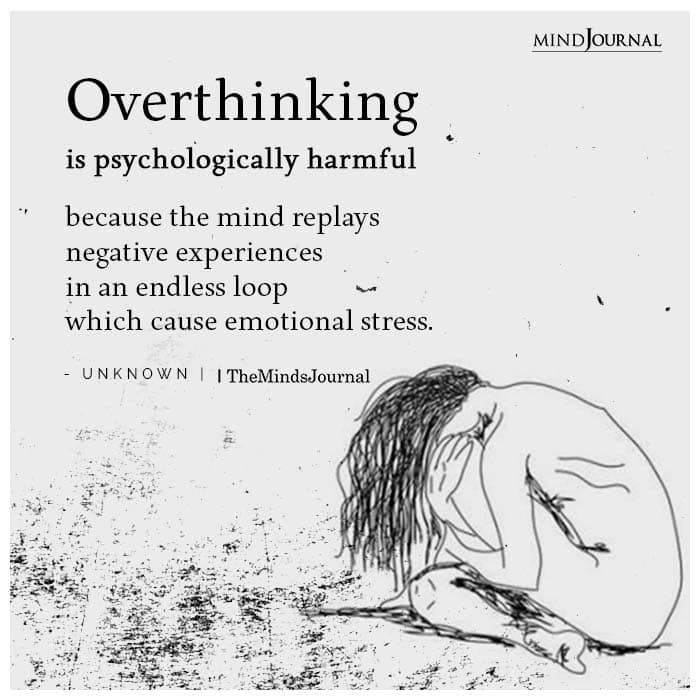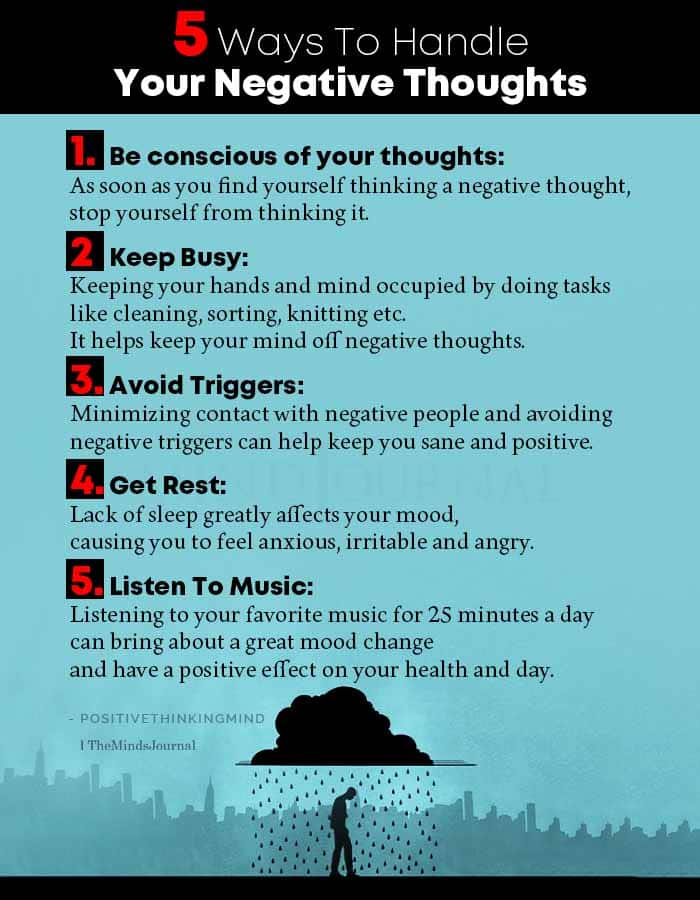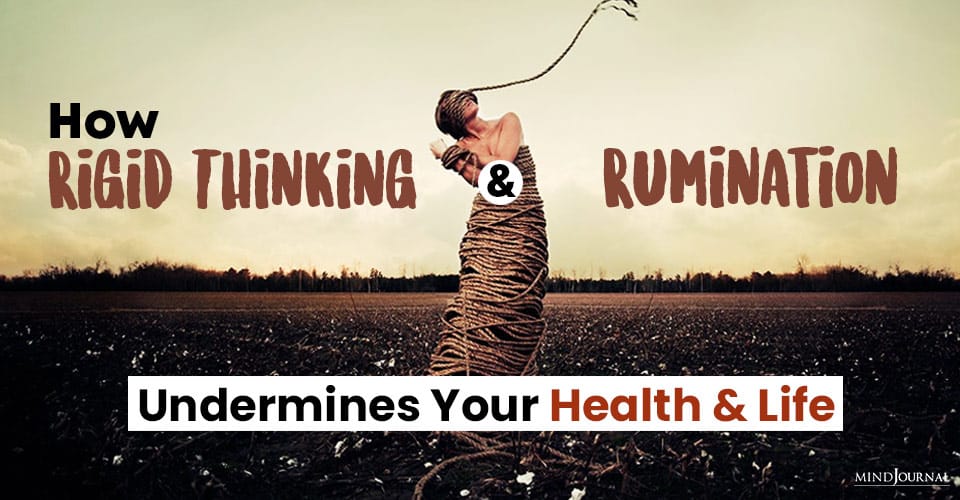Rumination is often considered as an offspring of rigid thinking and blame. These thought patterns are closely involved in the generation of negative thoughts, stress, anxiety, and depression. This is why you need to learn to stop ruminating and rigid thoughts when you hit rock bottom.
Rigid thinking, blame & rumination
Negative thoughts, powered by rigid thinking & blame, are a predictor of anxiety and depression, making us feel burnt out, exhausted and empty. Rigid thinking or mental rigidity is our inability to generate or accept a different perspective or emotions. It is characterized by refusal to acknowledge someone else’s viewpoints, lack of empathy, a strong sense of compulsion to do things in specific ways, and a need for predictability. It prevents us from appreciating alternative approaches or solutions to a problem. Rigid thinkers strongly hold on to generalizations & preconceptions and have high expectations that are usually left unmet. They are highly inflexible, have difficulty with changing old habits, thought patterns, and attitudes, have a strong need for perseveration through repetitive words & gestures, and become hostile or scared when facing unexpected obstacles or changes. In essence, rigid thinking is an inability to change. Unfortunately, the only constant in life changes. Hence, rigid thinkers frequently experience stress and anxiety which pave the way to the onset of different mental health problems, such as obsessive-compulsive and schizophrenic behaviors.
Related: 15 Common Cognitive Distortions That Twist Your Thinking
Blame is often regarded as a coping mechanism to deal with difficult and painful situations and emotions. Although self-blame can sometimes motivate us to improve ourselves through reflection, in the long run, irrational blame can result in serious mental health issues. Blame can make us falsely believe that we are not worthy and we are responsible for everything. It can poison our minds and keep us from moving ahead and living a better life. It is a damaging feeling that stops you from being productive and doesn’t allow you to heal. Studies have found that self-blaming emotions can lead to feelings of hopelessness, inadequacy, decreased self-worth, and depressed mood.

Both rigid thought patterns and self-blame lead to rumination, which is a psychological construct involving conscious, recurrent thoughts on a specific topic. “Rumination is a form of perseverative cognition that focuses on negative content, generally past and present, and results in emotional distress,” explains a study. When we have rigid thoughts and are unable to consider other perspectives, we become trapped within our preconceived notions and ideas about what and how life should be. Sadly, life always has its own plans regardless of how much you plan and prepare for it. So when faced with situations, challenges, failures, or opportunities that you didn’t expect, you feel unprepared, afraid, and disappointed. You may start believing that you are incompetent and unworthy or coping with life. This is where the blame seeps in. You believe your life is a chaotic mess because nothing is going according to your thoughts and beliefs. You feel anxious, stressed, guilty, and useless… all thanks to overthinking and rumination. But as you think only about the problems and not the solutions, you simply punish yourself psychologically.
Related: 8 Mental Filters That Feed Negativity and Depression
Rumination & mental health
Rigid thinking, blame, and rumination can affect our mental health adversely, impair our thinking and lead to negative emotions. Research shows that unconstructive repetitive & rigid thoughts can not only result in the development of psychiatric disorders, but it can also affect our physical health. When we ruminate, we focus on our problems, their probable causes, and consequences, instead of possible solutions. It is a process of thinking about the same intrusive, negatively-tinted thoughts repeatedly and continuously. It is considered a silent cause for psychological conditions, such as anxiety, neuroticism, eating disorders, obsessive-compulsive disorder (OCD), and depression. It can also impair our cognitive abilities to think & process feelings.
Research reveals that rumination is associated with affective disorders, memory control deficits, impaired suppression-induced forgetting, inhibitory control deficits in attention tasks, depression, and suicidal thoughts. “Rumination has been widely studied and is a crucial component in the study of cognitive vulnerabilities to depression,” states a 2008 study. As ruminative thoughts primarily have a negative tone, the persistence of such thoughts results in depression, believe researchers. One 2016 study has also found that rumination is related to “abnormalities in neural networks associated with emotional regulation and executive functioning,” along with internalizing disorders in adolescents. The study found that such negative and intrusive thought patterns “not only amplifies levels of distress and suicidal ideation but also extends physiological responses to stress, which may partly explain the high prevalence of physical and mental co-morbidity in youth.”
Related: The Effects Of Negative Emotions On Our Health
How rumination and rigid thinking affects us

Rumination and rigid thoughts can affect our mindset which can directly impact our lives. For instance, we all have certain ideas about what a committed, lasting relationship should be like with the right person. Whether we have learned from our parents, neighbors, relatives, or movies, we have this belief that a relationship with the “right” person or our “soulmate” will be magical. We believe that it will be a loving, caring relationship filled with happy experiences, memories, vacations, parties, and endless, unconditional love. We believe that we will raise the perfect children and live happily ever after. But rarely do real-life relationships turn out like that.
The basic problem with that belief is that we do not consider the real problems that will eventually crop up in our relationship. Firstly, there is no such thing as a “perfect” relationship. Secondly, relationships require constant work, compromise, adjustment, and sacrifices. You need to love yourself as much as you love the other person. You need to constantly express your love for your partner and show them how much you love them years after you get married. You need to learn how to manage conflicts in a healthy way, listen to your partner, understand their emotions, be empathetic, avoid being complacent, and take responsibility for making the relationship work. Relationships don’t come with any guarantees.
Related: 7 Negative Mindsets That Undercut Your Mental Strength and Resilience
Yet as you have grown up believing that a relationship with the right person will be perfect, your mind fails to make provisions for the umpteen relationship challenges that you are bound to face. Your mind starts to believe that any sign of problems or difficulties in a relationship is toxic, abusive, and bad for your mental & emotional health. So when you are in a “real” relationship, your mind finds it unacceptable & painful. The relationship is not what you expected it to be and that makes you unhappy. You feel empty, depressed and blame yourself and your partner for the failure of your relationship. However, the fact is you have let your relationship fail due to your own unrealistic expectations. Your thoughts and beliefs about an ideal relationship have let you down.
This is what rigid thinking does to you. The more you get entrapped in your preconceived beliefs, the more you blame yourself and others and the more you think about all the negative experiences. You keep yourself from being happy in the relationship and when you realize that, you blame yourself, leading to the onset of depression. But you are not the one to blame here. The problem is not with you. The problem is with your inability to have a flexible mindset, accept other perspectives, and see a relationship for what it is – a complicated yet rewarding experience. And to reach there, you need to change your thought patterns and prevent rumination.
Related: Can You Think Your Way to Well-being?
Ways to deal with rigid thinking, blame & rumination
If you are suffering from the consequences of such negative thought patterns, then there are certain strategies that can help you overcome them and develop a more positive and healthier mindset and attitude. Here are a few ways to deal with rigid thinking, blame & rumination –
1. Identify and avoid triggers
Rumination is often triggered by our fears, anxieties, and insecurities. Intrusive & negative thoughts often occur due to specific stressors like fear of failure or losing a loved one, recent traumatic experiences, low self-esteem, an upcoming stressful event, low self-esteem, perfectionism, facing fears & phobias, etc. In order to change your rigid beliefs and tendency to ruminate, you need to identify and manage your personal triggers and associated factors that lead to such thought patterns. If possible, restrict access to such triggers as long as they don’t affect your quality of life.

2. Change your mindset
Removing or changing strongly-held damaging beliefs that you have been harboring for a long time is undoubtedly challenging. However, in order to stop ruminating all the time and being imprisoned in your rigid thinking patterns & blame, you need to find ways to develop realistic optimism and adapt your beliefs. Learn to replace your negative thoughts with natural, positive thoughts. You can start the process by identifying your thought patterns, accept that it is something you need to change, recognize what changes you want to make, and develop behaviors that can help to accomplish your new goals.
Related: 4 Ways To Constructively Challenge Your Thinking
Here are a few other ways to change your beliefs and negative mindset –
- Be aware of your negative tendencies
- Build new habits
- Start journaling & writing down your thoughts
- Be intentional about doing things that you love and enjoy
- Set a separate time from rumination & replace negative thoughts
- Practice gratitude
- Learn to enjoy solitude and love yourself
- Deliberately engage in positive self-talk & practice positive affirmations
- Focus on the positive aspects of life
- Socialize more often and spend time with optimistic people
- Do nice things for others or help people in need
3. Take small steps
Figure out ways to let go of your rigid thoughts, be more relaxed and open to new ideas and perspectives. However, it is crucial that you set realistic, attainable, and small goals that you can accomplish in a short period of time. Establish multiple concrete and specific goals that lead to larger life goals. Take measured and small steps in achieving these goals and celebrate every small victory.
4. Mindfulness meditation
Practicing mindfulness meditation can help you become aware of your thoughts and emotions in a non-judgmental way and calm your mind. Studies show that with practice, you can gain control over your automatic and intrusive thoughts over time which can help you to manage rigid thinking, blame and rumination. One 2009 study has found that mindfulness-based stress reduction (MBSR) techniques, like meditation, helps to increase mindfulness and overall well-being while decreasing rumination and symptoms of depression.
Related: Meditation For Beginners: Everything You Need To Know About Meditation
5. Distract yourself
Find distracting things, topics or activities to engage in to disrupt your negative thought patterns and rumination. One 2009 study has found that suppression is an unsustainable & counterproductive strategy for dealing with intrusive, unwanted thoughts, while focused distraction is a “more effective technique” for managing such thought patterns. When you find yourself enslaved by intrusive thoughts, intentionally think about some complex and interesting topics or ideas. You may also try out some engaging and challenging activities, like solving puzzles or a Rubik’s cube to get some relief.
6. Seek medical help
If you believe that your rigid thinking patterns and rumination is beyond your control and if you are experiencing signs of severe anxiety, depression, OCD or schizophrenia, then make sure to visit a mental health professional immediately. Talking to a therapist can help you get equipped with the necessary tools required to alleviate symptoms and develop healthier beliefs, ideals, and thought patterns. Recent research shows rumination-focused cognitive behavior therapy (RFCBT) helps to relieve symptoms of anxiety & depression, increases behavioral activation, and improves overall functioning. In case you are dealing with ruminating thoughts about self-harm or suicide, then seek medical help immediately.
Related: 5 Tips To Help Get Rid Of Negative Thoughts

Apart from the above-mentioned strategies, here are some other simple and effective ways you can overcome rigid thinking, blame & rumination –
- Learn to let go of thoughts and ideas that don’t serve you
- Avoid being a perfectionist
- Spend more time in nature and get some exposure to the sun
- Engage in regular physical activity or exercise
- Try hypnosis or hypnotherapy
- Identify your strengths and abilities
- Boost your self-esteem
- Learn stress management techniques
- Avoid negative self-talk, self-criticism, self-blame and self-defeating thoughts
- Engage in creative activities like writing, painting etc
- Accept life as a balance of challenges and opportunities
Overcome negative thought patterns

If you are suffering due to intrusive and uncontrollable rigid thoughts and rumination, then the above-mentioned strategies can prove beneficial in overcoming such tendencies and patterns. Although you need to be intentional about your efforts and be aware of your thought patterns, it can help you deal with negative thoughts, anxiety, & depression. It can also empower you to develop optimism, openness, and more flexible thinking to live a happier, more positive life.
Related: How Healthy Thinking Techniques Can Help You Deal With Your Problems Better











Leave a Reply